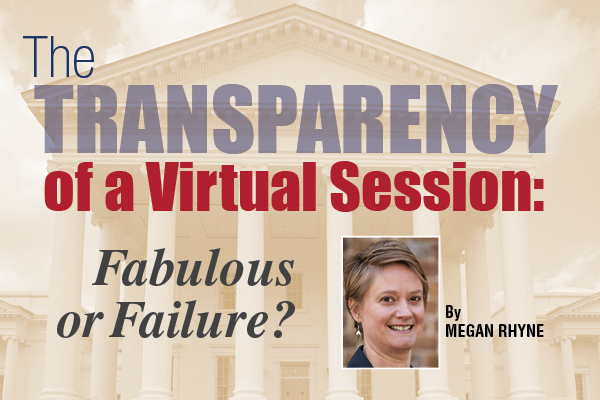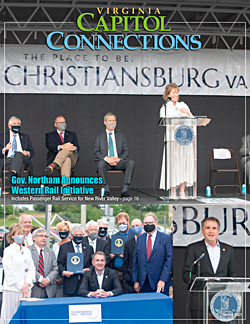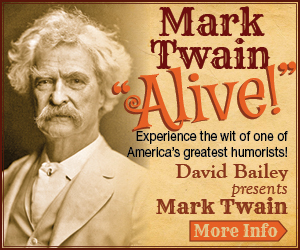

Click Here to read the entire
Spring 2021 issue, including the
article Passenger Rail Coming to
Virginia's New River Valley.
In December 2014, the president of the League of Women Voters of Virginia at the time, Anne Sterling, gathered together an assortment of lobbyists and advocates — most of them representing nonprofits and civic organizations — to get them talking among about the problems each had when trying to lobby for and against bills during General Assembly sessions.
It was a gripe session. I was there, and I griped along with them. Since we represented many different causes, we were all watching different committees and subcommittees. Yet our problems were universal: meetings were sometimes called with little or no notice. Some bills were never given a hearing in the committee. And it seemed like there were a whole lot of voice-votes being taken when bills were killed.
The more we groused, the more we realized that if we, whose job was to lobby, were experiencing this kind of frustration, imagine how citizens might fare in the convoluted maze and frenetic pace of the session.
What else we realized was that the problems we identified had little to do with individual committee chairs or which party was wielding the gavel. These were institutional problems. These were problems with a system that seemed to have lost touch with the public.
When the 2015 legislative session began, those of us who'd sat around the conference table the previous month fanned out to engage with the process as usual, but we agreed to keep track of what we saw and to report back to the group.
Each week over salads and tuna melts, we gathered anecdotes, taking note of dates, times, committees. Those of us who didn't already know the others quickly developed a camaraderie and a shared purpose. We believed we were doing something that had not been done before: measuring transparency in the Virginia General Assembly.
At Session's end, we tapped into the legislative information system (LIS) looking for statistics on how many bills were heard by each committee and how many of them passed or were defeated. Virginia Coalition for Open Government (VCOG). Chip Woodrum Legislative Intern that year, a junior public relations major from VCU, threw herself into number crunching. Soon, a disturbing picture emerged: in the House of Delegates, where 1,892 bills and resolutions were considered, 825 of them were defeated and 630 of those (76%) were defeated by voice votes. In fully three-quarters of the bills defeated in the House, there was no public record of who voted to kill those bills or who wanted to salvage them.
That was the top-line finding of that 2015 report, but it wasn't the only issue we highlighted: inconsistent notice of meetings, including last-minute meetings held at the legislators' desks at the end of a floor session, and public testimony arbitrarily limited by some committee chairs while other chairs took great pains to ensure everyone had a fair chance to comment.
After its release, that first report was criticized as being politically motivated. It was an understandable, though misguided characterization. Yes, it implicitly criticized Republicans, since they chaired all of the committees and subcommittees at the time, but it also implicitly criticized the Democrats who could have taken advantage of rules to request a vote on the record but didn't.
But the report did not call out either party nor mention the fate of any particular bill because, as noted, this was an institutional issue. In our 2016 report, we pointed out that in 2003 (when the Republicans also held the majority in the House) only 3% of bills defeated were disposed of without a recorded vote. What had happened over the previous decade?
In subsequent reports, Transparency Virginia (TVa) praised changes instituted to address TVa's concerns: a new House meeting notification system and a prohibition on meetings at member desks (2016); archiving of House and Senate floor session videos (2017); and the live-streaming of committee meetings and a new House rule requiring recorded votes on all motions to defeat bills (2018).
Transparency Virginia members knew from their years of experience that had the parties flipped their positions of power, that the same trends and problems would have persisted. Indeed, after initially plummeting in 2018, the percentage of bills defeated on unrecorded voice votes gradually crept up in 2019, when Republicans were still in charge, and continued the upward trend after Democrats took over in 2020.
As TVa's 2021 report detailed, the percentage of bills killed without a recorded vote has become synonymous with bills that are not considered at all. In the House, 42% of the bills that do not pass (in the Senate, it's 25%) are bills that are left in the committee without an up or down vote, which deprives the public of the ability to monitor their elected officials' positions on a variety of bills.
Despite its continued efforts to track the trends on voting, notice and consideration of bills, the 2021 TVa report is like no other, because the 2021 General Assembly session was like no other. The Senate met face-to-face, but the House met by Zoom call, and the public had no opportunity to physically interact with legislators of either chamber.
Everyone made do with the arrangement, even with the expected partisan grumbling and procedural maneuvers. With the death of Sen. Ben Chafin due to COVID-19 just days before the session's start, lawmakers, staff, lobbyists and the public were acutely aware of the potentially lethal consequences of congregating to debate legislation during a pandemic.
Conducting business online created some positive developments, like improved notice of meetings that had to be scheduled through online platforms, the live-streaming of subcommittee meetings and the opening up of public comment to citizens across the state who typically cannot travel to Richmond to testify in person.
Online meetings and comments threw some existing problems into stark relief, including the compressed and inconsistent time limits imposed on all supporters or opponents of a bill and limits on each individual speaker. There were no chances to query a lawmaker or some other observer about why a bill was being left in committee. Already secret conference committees (which are really just email exchanges among committee members), were even more out of reach of the public, not to mention lawmakers themselves.
The all-virtual session also created its own unique problem, and this is the one that cannot be fixed with improved processes, training or advancements in technology: the loss of human interaction.
When legislators meet each year, in every state, of every political stripe, they are gathering to solve problems. Problems they themselves have identified, those that their constituents have raised, those that organizations, businesses and advocates have brought to their attention. Bills are offered as solutions to these problems. Solving problems requires ideas, input and interaction. There is never one single solution. Details are important. Wording matters.
Problem-solving cannot happen in a vacuum, but notwithstanding email, phones, texts and Zoom chats, that is essentially what the 2021 session was.
What we all learned this session is how much problem-solving goes on in the margins. When we meet in person, we are having dozens of conversations all day long, be they scheduled meetings with a lawmaker in an office, serendipitous chats in the elevator, spontaneous discussions in line for coffee or walking to a committee meeting. Lobbyists and advocates are talking in committee rooms, while waiting for the floor session to end, in the hallways between meeting rooms. There are confabs during meetings. Information is gleaned from secretaries, aides, clerks and staff attorneys.
The in-person conversations we have are different, too, because we can gauge reactions and break in with clarifying questions. Nuance is usually lost in emails or texts. Not everyone has access to lawmakers' personal or preferred phone numbers or email addresses. Lawmakers can ignore messages and calls during an in-person session as easily as during an all-virtual one, but it's very hard to avoid each other face to face.
I haven't talked to a single lobbyist or advocate — from the professional, full-time lobbyist to folks like me where lobbying is but one part of my job — who preferred the virtual session. Lobbying and advocacy is about relationships and relationships need human-to-human interaction to grow and thrive.
I am sure all of my colleagues at Transparency Virginia would much prefer to get back to counting votes and tracking meeting notice in 2022 than to have to endure another virtual session. But whatever comes our way, TVa will be there, as it has been for the past seven sessions, to shine a light on the Virginia legislative process.
Megan Rhyne is the Executive Director for Virginia Coalition for Open Government.




